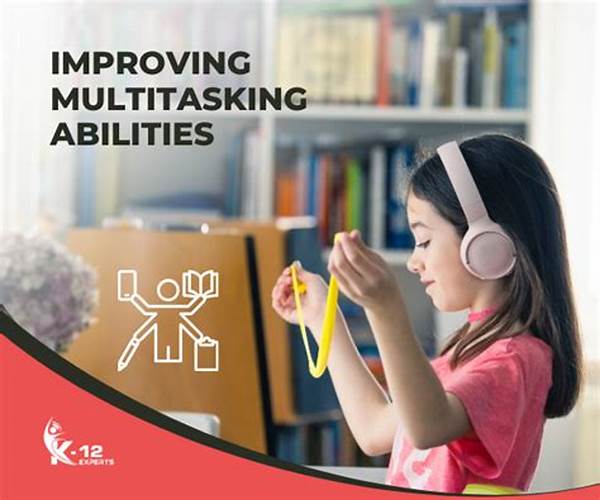Once upon a time in a buzzing city lived a gal named Lara. She was your average college student except for one thing—she spoke three languages fluently. Starting her day with French, switching to Spanish by lunch, and ending in English, Lara thought she was just indulging a passion. But little did she know, her bilingualism was secretly boosting her multitasking abilities.
Read Now : Facilitating Club Discussions Effectively
Juggling Words and Tasks
When Lara’s friends were struggling to balance study sessions with part-time work, there she was, breezing through life like it was nobody’s business. You see, bilingualism isn’t just about rolling off “bonjour” or “hola” at the right time. It’s a brain workout, folks! Lara noticed she could handle rapid-fire texts while solving math problems like a ninja, thanks to her heightened multitasking abilities. Her secret? Switching languages prepped her brain to toggle between tasks like changing TV channels. Her brain was doing push-ups, flexing its cognitive muscles every time she switched linguistically.
Her multitasking skills became legendary. Friends often asked her how she did it. The answer? Bilingualism gave her brain the dexterity of a circus juggler. Studies back her up—those who speak multiple languages often excel at multitasking. So next time you’re scrambling between your Spotify playlist, Zoom calls, and making avocado toast, remember that a little bilingual sprinkle might just be the magic ingredient for ace multitasking abilities. Who would’ve thunk it, huh?
The Secret Sauce
1. Brain Gymnastics: Bilingualism = mental acrobatics, prepping your noggin for mad multitasking abilities.
2. Switching Up: Jumping languages? It’s like switching gears, training your brain to manage tasks seamlessly.
3. Distraction Dodging: Handling languages means dodging distractions like a pro, upping your multitasking game.
4. Memory Maestro: Bilingual folks often have stellar memories, crucial for juggling tasks like a boss.
5. Focus Freak: Bilingualism amps up your focus, letting you juggle tasks without dropping the ball.
Brain Benefits of Bilingualism
Bilingualism isn’t just a nifty party trick; it’s like having a Swiss Army knife for your brain. Imagine chilling on a weekend afternoon, switching from your fave Netflix show in Spanish to cooking up a French dish. All this mental hopping sharpens your multitasking abilities. Researchers say this constant shift ain’t just for kicks; it forges brain pathways making cognitive flexibility second nature.
Picture Lara, back at her dorm weaving through languages like a DJ spinning tracks, effortlessly jumping from a sociology paper to organizing the weekend fiesta, flaunting her multitasking abilities. With a repertoire of expressions and cognitive flexibility, she maestros through the chaos while her pals scratch their heads. Bilingualism rewired her noggin, transforming daily chaos into a seamless symphony.
How Multitasking Abilities Get a Boost
Multitasking abilities aren’t just about juggling tasks but doing it with flair. Bilingualism offers that flair. Imagine bilingualism is like turbo mode for your brain’s operating system. Flipping between Spanish verbs and English slangs, each transition greases the multitasking machinery. Bilingual peeps have brains that adapt and reroute with a snap.
1. Fast Track Processing: Bilingualism upgrades your neural RAM for quicker processing.
2. Cognitive Crossfit: Each language swap is like a mental Crossfit session, strengthening multitasking.
3. Info Highway Navigation: Juggling languages sharpens navigating mental highways smooth like butter.
4. Inhibition Skills: Blocking irrelevant info while focusing—language knows how to play that game.
5. Problem-Solving Ninja: Language jugglers often slay obstacles faster, translating to slick multitasking.
Read Now : “novels Based On Actual History”
6. Executive Function Power-Up: Executive functions? Bilingualism levels up those, leading to better task management.
7. Brain Circuit Flex: Swapping languages? It rewires circuits for efficient task exchanges.
8. Reaction Time Zoom: Quick language commands mean zippy multitasking responses.
9. Attention Diver Attention: Bilingualism fosters attention hopping, a key multitasking tool.
10. Mental Multiverse: Living in a bilingual world creates parallel thinking gear, acing task flow.
A Day in Lara’s Bilingual Life
Get this—Lara’s life is like a movie montage, jumping from one scenario to another without breaking a sweat. It’s Tuesday morning, and Lara is scarfing down breakfast, texting her bestie in French, and listening to her Spanish podcast. Her phone buzzes—a call from her mom in English—like she’s flipping channels on a multilingual TV. That flawless switch? It’s all thanks to her bilingualism pumping up her multitasking abilities.
Off to college, she zigzags through conversations in three languages, brain firing on all cylinders. Homework? Child’s play. She’s blasting through assignments while sending memes to her globally scattered pals, perfecting her art of multitasking. Bilingualism has been her secret study hack, keeping her brain limber, aceing exams without drowning in caffeine.
Evenings? They’re all about prepping dinner while jamming to Swedish tunes, turning her dorm kitchen into a global gourmet paradise. Lara isn’t just cooking; she’s managing music changes, recipe swaps, and group messages—like a maestro conducting a complex symphony. Every task a note, each language a melody, and multitasking abilities? That’s the orchestra. Guess her friends won’t be surprised if one day she effortlessly spins plates at a circus too!
The Science of Language Juggling
Bilingualism is like having a secret superpower stuffed in your back pocket. Scientists say that speaking two or more languages makes your brain into a multitasking powerhouse. The cognitive flexibility from language switching improves attention and task management. Think of it as mental muscle-building—your brain getting swole, both linguistically and cognitively.
Lara, with her multilingual chatter, sharpened her focus. This wasn’t just about language fluency, but about using those languages to juggle life. Bilingualism offered her a mental toolkit, refining her multitasking abilities to a point where tackling numerous tasks became second nature. While her colleagues struggled with coffee jitters, Lara thrived on her trilingual adrenaline.
Wrapping It Up
In the grand carnival of life’s tasks, bilingualism isn’t just a performer—it’s the ringmaster. It shapes your brain, enhancing multitasking abilities to a point where life feels more like a dance than a sprint. So, if your life feels like it’s played on fast-forward, maybe it’s time to embrace the language thrill.
Lara’s journey in bilingualism has shown that with each word and phrase, she unlocked a cognitive advantage, making life’s daily chaos a symphony of productivity. So whether you’re juggling projects, tasks, or social commitments, remember: multilingualism might just hold the key to unlocking your multitasking mojo. Who knew that speaking a couple of languages could turn you into a multitasking machine? Certainly, not her friends—until now.




